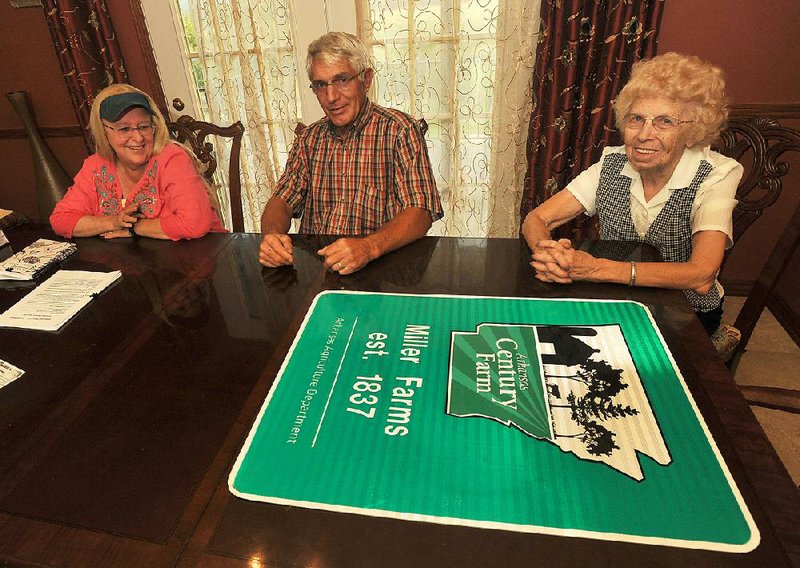FAYETTEVILLE -- Six generations are buried in the Miller family graveyard and three more stand on the shoulders of those giants.
The Millers own the oldest farm to participate in the Arkansas Agriculture Department's Century Farms program, which honors families who have owned and farmed the same land for more than 100 years. The Millers have owned their property for 177 years and raised cattle -- along with occasional forays into crops and chickens.
At one time, the family owned about 2,000 acres in what used to be called Miller Valley. The family still owns around 350 acres. James Miller, his older brother, Charlie Miller, and their mother, Edythe Miller, live on the property. Edythe Miller's other children, Linda Swanson and Sam Miller, live off the property but within Washington County.
"We load up and take the kids back to the river and go swimming and go fishing," James Miller said. "You get to thinking, well shoot, my dad used to do this. His dad used to do this. That's pretty cool."
The Millers' story is that of many families in Arkansas. They started on the farm, but education and other interests allowed the descendents to choose their own paths. The family members work at jobs outside the farm and the cattle are raised by outside help.
James Miller, who works for Superior Industries, said his father wanted family members to pursue their passions.
"When I was a senior in high school, me and dad was sitting at the counter one day and he asked what I was going to do when I graduated," James Miller said. "I said, 'I don't know. I think I want to go to school.' He asked what I wanted to be. I said I thought I wanted to be a mechanical engineer. He said, 'Really?' He didn't say a whole lot about it."
James Miller found out later his father had studied mechanical engineering before he was drafted into the military.
"I think he didn't care what his kids did as long as they were happy," he said.
And the Millers work hard to keep connected to their heritage. Just 4 miles south of downtown Fayetteville, the Millers stand in the family graveyard on the family acres. It didn't used to be so clean, they say.
"It's been unkempt for a lot of years and, what was it, 10 years ago we came in and cleared this up," James Miller said. "You know, having your own family cemetery with this history, this is something you want to preserve, right? It's pretty special to us. This is probably where we'll all be buried, I guess."
James Miller glances at Joseph Miller's headstone. He moved the family from Kentucky to Arkansas in the mid-1830s after a rough winter, establishing the family's homestead in Fayetteville. The family members said they owe it all to him.
And James and Sam Miller wouldn't consider leaving Northwest Arkansas.
"We never made enough money to move," James Miller said, laughing.
"Can't afford to go nowhere else," Sam Miller said.
"That's basically it," James Miller said.
Cheryl Miller, Sam's wife, also couldn't imagine leaving.
"I have four different sets of grandparents that were here before the Civil War," she said. "You just don't think about moving because you know everybody and everybody knows you. We tend to be people who don't like change."
A stubborn determination to stay -- to never even consider leaving -- is what keeps farm families on their land, said Cynthia Edwards, deputy secretary of the Arkansas Agriculture Department.
She started the Century Farms program in 2012 after seeing similar programs in other states. She expected maybe 20 people to apply. In its first year, the program received more than 80 applications.
Edwards was surprised again at an awards ceremony for recipients of the designation.
"We were just going to give them a sign, but people wanted to get up and say something," she said. "We have heard the greatest stories and they all boil down to one thing: how hard it is to keep the land in the family."
Families spokes about disease, divorce, wars, and the Depression, she said.
The Millers received a sign from the Agriculture Department two years ago, but they haven't yet decided where to put it. It's in Edythe Miller's living room for the time being.
The family members talked about hanging the sign on the cemetery gate, but they would have to drill holes in it, and Cheryl Miller grimaced at that thought.
"You don't know how it would be treated by people who drive by," she said. "It means something. I mean, to me, that sign is almost as sacred as that cemetery."
SundayMonday Business on 09/07/2014
